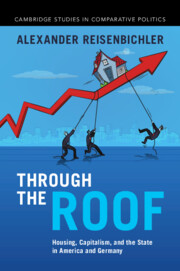Refine search
Actions for selected content:
759 results
3 - The Progressive Case against Antimonopolism
-
-
- Book:
- Toward an Inframarginal Revolution
- Published online:
- 26 September 2025
- Print publication:
- 16 October 2025, pp 45-99
-
- Chapter
- Export citation
8 - Self-Colonization in American Law
-
-
- Book:
- Toward an Inframarginal Revolution
- Published online:
- 26 September 2025
- Print publication:
- 16 October 2025, pp 231-297
-
- Chapter
- Export citation
7 - American Hierarchy and Its Discontents: Unpacking the Consequences for Partner States
-
- Book:
- Hierarchy and the State
- Published online:
- 20 August 2025
- Print publication:
- 02 October 2025, pp 138-160
-
- Chapter
- Export citation
11 - Inequalities between Individuals, Households and Nations
-
- Book:
- An Economic History of Europe
- Published online:
- 02 October 2025
- Print publication:
- 02 October 2025, pp 254-274
-
- Chapter
- Export citation
Chosen (not) to win? Party nomination strategies and the unequal class representation in parliament
-
- Journal:
- European Journal of Political Research ,
- Published online by Cambridge University Press:
- 30 September 2025, pp. 1-21
-
- Article
-
- You have access
- Open access
- HTML
- Export citation
Passive inequality and the dilemma of meritocracy
-
- Journal:
- Experimental Economics / Volume 28 / Issue 2 / March 2025
- Published online by Cambridge University Press:
- 22 September 2025, pp. 379-400
-
- Article
-
- You have access
- Open access
- HTML
- Export citation
7 - Beyond Access to Justice
- from Part II - Lessons from the Field
-
-
- Book:
- Rethinking the Lawyers' Monopoly
- Published online:
- 04 September 2025
- Print publication:
- 18 September 2025, pp 156-172
-
- Chapter
-
- You have access
- Open access
- HTML
- Export citation
3 - The Hypocrisy of Attorney Licensing
- from Part I - Framing the Issue
-
-
- Book:
- Rethinking the Lawyers' Monopoly
- Published online:
- 04 September 2025
- Print publication:
- 18 September 2025, pp 64-86
-
- Chapter
-
- You have access
- Open access
- HTML
- Export citation
1 - Justice Futures
- from Part I - Framing the Issue
-
-
- Book:
- Rethinking the Lawyers' Monopoly
- Published online:
- 04 September 2025
- Print publication:
- 18 September 2025, pp 25-39
-
- Chapter
-
- You have access
- Open access
- HTML
- Export citation
Inequality, information, and income tax policy preferences in Austria and Germany
-
- Journal:
- Political Science Research and Methods , First View
- Published online by Cambridge University Press:
- 12 September 2025, pp. 1-11
-
- Article
-
- You have access
- Open access
- HTML
- Export citation
1 - Introduction
-
- Book:
- Through the Roof
- Published online:
- 28 August 2025
- Print publication:
- 11 September 2025, pp 1-27
-
- Chapter
- Export citation
Chapter 1 - Stand-Up in the United Kingdom
- from Part I - Time and Place
-
-
- Book:
- The Cambridge Companion to Stand-Up Comedy
- Published online:
- 21 August 2025
- Print publication:
- 04 September 2025, pp 23-42
-
- Chapter
- Export citation
Constitutional Judging under Pressure: The Role of Judges in Safeguarding the Rule of Law, Equality, and Planetary Survival
-
- Journal:
- German Law Journal / Volume 26 / Issue 2 / March 2025
- Published online by Cambridge University Press:
- 01 September 2025, pp. 139-152
-
- Article
-
- You have access
- Open access
- HTML
- Export citation

Through the Roof
- Housing, Capitalism, and the State in America and Germany
-
- Published online:
- 28 August 2025
- Print publication:
- 11 September 2025
Canada’s Increasing Class-Based Voting Disparities Amidst Declining Economic Policy Saliency
-
- Journal:
- Canadian Journal of Political Science/Revue canadienne de science politique , First View
- Published online by Cambridge University Press:
- 25 August 2025, pp. 1-27
-
- Article
-
- You have access
- Open access
- HTML
- Export citation
Chapter 1 - Introduction
-
-
- Book:
- Questioning Conventional Assumptions of Competition Dynamics
- Published online:
- 07 May 2025
- Print publication:
- 21 August 2025, pp 1-15
-
- Chapter
- Export citation
Chapter 11 - Conclusion
-
-
- Book:
- Questioning Conventional Assumptions of Competition Dynamics
- Published online:
- 07 May 2025
- Print publication:
- 21 August 2025, pp 264-300
-
- Chapter
- Export citation
8 - The Enlightenment
- from Part II - Notions and Practices of Equality
-
- Book:
- Democracy's Double Helix
- Published online:
- 09 September 2025
- Print publication:
- 14 August 2025, pp 171-184
-
- Chapter
- Export citation
Introduction
-
- Book:
- The Secret Life of Copyright
- Published online:
- 08 August 2025
- Print publication:
- 14 August 2025, pp 1-23
-
- Chapter
- Export citation

The Secret Life of Copyright
- Intellectual Property and Inequality in the Age of AI
-
- Published online:
- 08 August 2025
- Print publication:
- 14 August 2025
